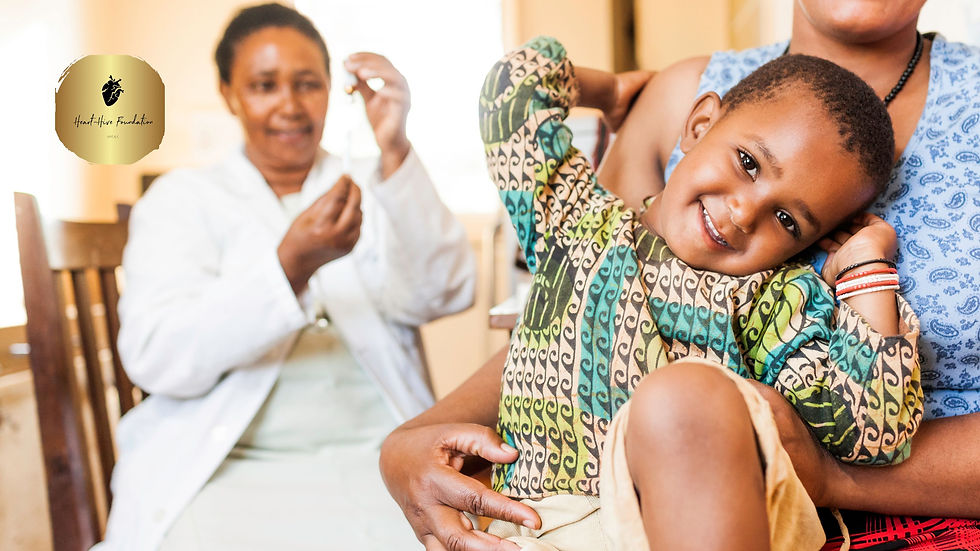Every Shot Counts: Protecting Underprivileged Children Through Vaccines
- hearthiveorg

- Jun 30, 2025
- 5 min read
Updated: Aug 23, 2025
According to the World Health Organization, immunization stands as one of the greatest achievements in global health, saving millions of lives each year. Vaccines work by training the body’s immune system to recognize and fight off diseases, significantly reducing the chances of infection.
Today, vaccines protect against more than 30 serious diseases, enabling people of all ages to live longer and healthier lives. Each year, immunization prevents between 3.5 million and 5 million deaths from illnesses such as diphtheria, tetanus, pertussis (whooping cough), influenza, and measles.
As a core component of primary health care and a fundamental human right, vaccines are among the most cost-effective health interventions. Vaccines play a crucial role in preventing and controlling disease outbreaks, supporting global health security, and curbing the spread of antimicrobial resistance.

However, the COVID-19 pandemic placed immense strain on health systems worldwide, leading to major setbacks. Recent figures on diphtheria-pertussis-tetanus (DTP) vaccination rates highlight the urgent need for catch-up efforts and stronger immunization infrastructure.
Measles, due to its high contagion rate, serves as a key indicator of immunity gaps. In 2023 alone, 22 million children missed their routine first dose of the measles vaccine—an increase from 19.3 million in 2019—signaling a critical need for action and a clear threat to every child’s right to survival.
Reasons for Vaccinating Underprivileged Children

Why is vaccinating underprivileged children one of the smartest and most life-saving investments we can make? Discover the powerful reasons that go beyond just disease prevention.
Higher Disease Risk
Underprivileged children come from communities that are significantly more vulnerable to infectious diseases due to a lack of access to clean water, proper nutrition, sanitation, and quality healthcare. These environmental and social conditions create the perfect storm for illnesses like measles, pneumonia, and diarrheal diseases to spread rapidly—and tragically, many of these diseases are preventable through vaccination. The higher disease risk these children face isn't just a matter of bad luck; it’s the result of systemic inequality that leaves them unprotected and often overlooked.
Vaccines offer a proven, powerful solution. A single dose can mean the difference between life and death, health and lifelong disability. Immunization not only protects the child receiving the vaccine but also helps create a safer environment by reducing the overall spread of disease within the community. For underprivileged children and their families, where healthcare access is limited and treatment costs are burdensome, prevention through vaccination becomes not just necessary, but urgent and lifesaving.
Life-saving Protection
As mentioned, vaccines offer critical protection against life-threatening diseases like measles, polio, and hepatitis—illnesses that disproportionately impact vulnerable populations, especially underprivileged kids. In areas with limited healthcare access, these diseases can spread quickly and cause severe complications, including disability and death.
Expanding vaccine access is not only a matter of public health but also a reflection of altruism and empathy—a commitment to protecting those who are most at risk.
Measles alone can lead to pneumonia, brain damage, or blindness, while polio can result in lifelong paralysis. Hepatitis infections can silently damage the liver over time, often going untreated. Vaccination is a simple, safe, and cost-effective way to prevent these outcomes. By immunizing children early, we not only protect individual lives but also strengthen community health and reduce the risk of outbreaks.
Child Development
Vaccines play a vital role in supporting a child’s healthy development by protecting them from illnesses that can cause long-term physical and cognitive harm. Preventable diseases like meningitis, measles, and rubella can lead to complications such as hearing loss, brain damage, or developmental delays. By keeping children safe from these threats, vaccines allow them to grow, learn, and thrive without the setbacks caused by repeated illness or hospitalization.
Immunization ensures children can attend school consistently, stay nourished, and remain active during critical growth years. In essence, vaccines provide a strong foundation for a child’s overall well-being and future potential, serving as a vital form of aid that supports long-term development and opportunity.
Breaking the Cycle of Poverty
Vaccines are a powerful tool in breaking the cycle of poverty, especially for underprivileged families. When children are protected from preventable diseases, they are more likely to grow up healthy, attend school regularly, and reach their full potential. This improves their chances of gaining an education and securing better economic opportunities later in life. For families already struggling financially, avoiding costly hospital visits and long-term care for illness or disability eases their economic burden.
Additionally, healthier communities experience fewer outbreaks, enabling parents to work consistently and support their families. By preventing disease, vaccines help lift families and entire communities toward a more stable, self-sufficient future. Immunization doesn’t just save lives—it strengthens them, offering a real chance to break free from the grip of poverty across generations—all for children’s benefit, both now and in the future.
Social Justice and Equity
Vaccines are deeply connected to equity and social justice because it ensures that all children—regardless of where they are born or their socioeconomic status—have a fair chance at a healthy life. In many underprivileged communities, preventable diseases continue to claim lives simply because vaccines are out of reach. This disparity highlights a global injustice: children in wealthy areas are protected, while those in poverty remain vulnerable. Immunization programs that prioritize access for marginalized groups help correct this imbalance by placing health within reach for everyone.
Vaccines empower entire communities by reducing disease burden, improving school attendance, and supporting economic growth. Ensuring equal access to vaccines is not just a health priority—it’s a moral imperative. By closing the immunization gap, we affirm every child’s right to survive, thrive, and contribute fully to society, regardless of their background or birthplace. In this way, vaccines are a path toward greater social justice and dignity for all.
Rolling Out Vaccinations for Underprivileged Children

At Heart Hive Foundation, we believe that no child should be left behind when it comes to life-saving vaccines. In many underserved communities, access to immunization is not just limited—it’s nearly impossible. That’s why Heart Hive is committed to implementing targeted immunization programs that reach the most vulnerable children. Inspired by models like the Vaccines for Children (VFC) program in the United States, we aim to provide free, accessible vaccines to children in impoverished areas, ensuring they receive the protection they deserve regardless of financial status or location.
But vaccines alone are not enough. Community outreach and education are essential parts of our mission. Heart Hive works closely with local health workers and volunteers to engage directly with families. These trusted figures help counter misinformation, ease vaccine hesitancy, and encourage parents to protect their children. Through personal connection and clear communication, we build trust and boost confidence in immunization.
To make these efforts sustainable, Heart Hive Foundation also prioritizes strengthening health systems. We support training programs for healthcare workers, improvements in vaccine storage and transport, and investment in local infrastructure. Whether it’s helping a rural clinic upgrade its cold chain or supplying mobile teams in conflict zones, we aim to make sure vaccines reach every child safely and efficiently.
Together, these three pillars—targeted immunization, community outreach, and stronger health systems—form the foundation of our work. By tackling barriers to access and education at the same time, we help reduce preventable deaths and give children the healthy start they deserve. At Heart Hive Foundation, providing vaccines is more than a medical service; it is a step toward dignity, opportunity, and a fairer world for all children, no matter where they are born. Donate today and help roll out vaccination programs for many underprivileged children all over the world.
.png)



Comments